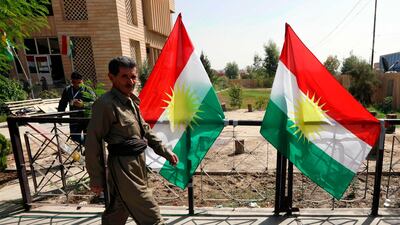The Kurdistan Democratic Party (KDP) in Iraq won the region's parliamentary elections on Sunday in a poll marred by fraud allegations that clouded the outcome of the vote.
Iraqi Kurds voted last month in a poll that could disrupt the country's fragile power sharing system, but the results were delayed due to the electoral commission receiving and investigating over 1,000 complaints of electoral violations.
The commission said on Sunday the Kurdistan Democratic Party (KDP) received 45 seats after gaining around over 700,000 votes, falling 12 seats short of an outright majority in the 111-seat body.
Its rival and junior coalition partner in government, the Patriotic Union of Kurdistan (PUK), came second by obtaining 21 seats. The region's largest opposition party, Gorran, or Movement for Change, came in third. It accused the PUK and KDP of vote-rigging and fraud.
"The results shows the KDP has come first by a far margin with 60 per cent ahead of the PUK, despite all the concerns we had on the handling of the vote in some areas, especailly after some 120,000 votes were cancelled because of complain and violations," KDP official, Janghis Awakaly, told The National.
The number of Kurdish voters has shrunk in recent elections as the region’s stagnant politics, unpaid public sector salaries and corruption have undermined the population’s faith in politics.
Despite the fact that election results are now announced, the Kurdish judiciary commission will need to formally accept the results, Mr Awakaly said.
"Subsequently, parliament will have it's first session and we as KDP will start negotiations to form a new cabinet, I believe the next cabinet will be different from current and previous one," he said.
Iraq's Kurdistan region is divided into areas controlled by the two ruling parties. Yet, parliament has been largely paralysed since 2015 following a dispute over then President Masoud Barzani seeking an extension of his term, while both parties embraced a failed referendum on independence last year.
The KDP and PUK fought a civil war in the 1990s but have more recently taken to sharing power. Both have emerged from a gruelling political battle in Baghdad, where they competed for the presidency of federal Iraq. The PUK came out on top with the election of Barham Salih.
"I believe the next cabinet will be different from the current and previous one. I am sure that the KDP will ask the PUK to be part of next government but their participation might not be as before," Mr Awakalty said.
Both Gorran and the Kurdistan Islamic Union (KIU) said on Sunday that it rejects the results.
"Gorran Movement has rejected the results and it has not made a final decision yet. Fraud has been institutionalised to the extent that half the population has completely lost faith in the electoral process. This is dangerous for the security and stability of Kurdistan Region," Hoshyar Omar, head of diplomatic relations for the Gorran Movement in Kurdistan, told The National.
The KIU threatened to take legal action against the results by claiming that the election and referendum commission failed to obtain the trust of members of the commissioners’ council.
“The results were announced with a majority of votes in an incomplete way at midnight.”
Elsewhere in Baghdad, the Prime Minister designate Adel Abdul Mahdi is expected to present his new cabinet to parliament on Monday, according to Iraqi officials.
"The Prime Minister designate, Adel Abdul Mahdi, will submit his government of 22 ministerial portfolios distributed by nine ministries of the agenda of reform and reconstruction," an Iraqi official said.
The premier designate might postpone the announcement of four to five portfolios to a later date because of internal sectarian differences, the official told The National.
Mr Abdul Mahdi has until early November to submit his cabinet and bring together the political factions. If he fails, another candidate will be chosen for the country's top post.
"The prime minister-designate...is carrying out the necessary communications with the head of parliament and the blocs to set a day" to present the cabinet, his office said in a statement last Thursday.
Baghdad's new cabinet is expected to address widespread civic unrest and ease standoffs across the country that has brought months of deadlock following elections in May.
The premier is seen as an independent who brings years of experience to the top post.
___________
Read more
Iraq parliament delays vote for country's president
Iraq offers citizens opportunity to apply online for cabinet positions
Iraqi KDP leads preliminary results from Kurdistan Region election
____________

